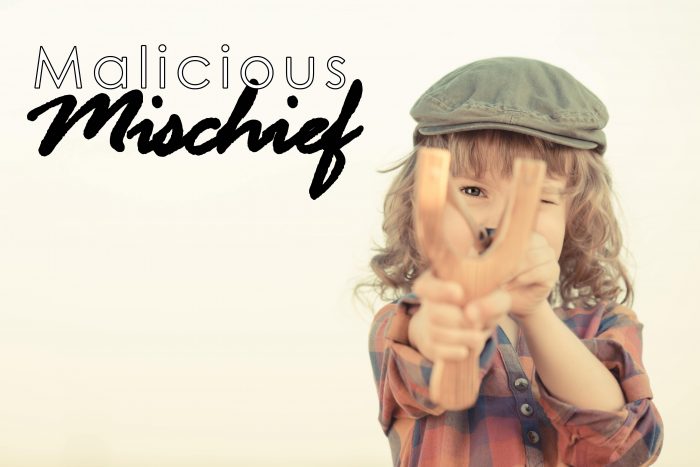Malicious Mischief

Malicious Mischief
If you’ve raised, or are currently raising, a teenager, you know just how spontaneous and chaotic it can be. You were also a teen once. Now that you’ve got kids of your own, you feel bad for all the hell you caused your parents growing up. Now, you get it.
Teenagers have a mind of their own. As much as we try to guide them in the right direction, parents can’t always be there to make sure their kid is making the right decision. Sometimes, it ends badly. We’ve all been there, right? Have you ever had an idea that seemed great at first, and ended up being a mistake? When you’re a teenager, everything feels like an awesome idea until it ends badly. Then, lessons are learned. Hopefully.
Teenagers are mischievous until they learn. They can end up doing stupid things, like throwing a house party or egging their least favorite teacher’s house. Are you, as a parent, responsible for the destruction your child makes to another’s property?
Insurance is there to help us when accidents happen. But what happens when the damage wasn’t exactly an accident–it was done intentionally? The truth is, in some cases, insurance is there to help when malicious mischief occurs. Vandalism is intentional damage caused to another’s property. Mischief is essentially the same thing; only the damage is unintentional. For example, a child may egg a house without realizing the damage the eggs can cause. Some kids may initially think an activity is harmless.
On many homeowners insurance policies, there is coverage for “malicious mischief.” Some homeowners policies may require that you add this coverage as an endorsement. If your teenager causes damage to another person’s property, you may be held liable for the cost to replace the damaged property. When you’re young, it’s hard to recognize the extent of the damages caused by mischief because young people are not yet working hard to earn their money. Attempt to discuss the value of buying something with hard-earned money to instill a sense of respect for your property in your teen’s mind.
Often, malicious mischief inclusions are important for properties that are unoccupied for lengths of time, such as a vacation home. The risk to insure these properties is higher because the frequency of claims is more likely to be higher than a property that is consistently occupied. For these properties, the deductible is higher. Vandalism is not covered in homes that have been vacant for up to 60 days or more. Also, if the insured is the person committing the vandalism, the damages are excluded from the policy.
If you have misbehaving teens, try asking your independent agent if your homeowners policy has coverage for their uncontrollable behavior.
Do you have questions about your insurance? Find an insurance agent near you with our Agent Finder
Search All Blogs
Search All Blogs
Read More Insurance Blogs
A Presidential Legacy: Using Life Insurance to Fund Your Charitable Vision
What will your legacy be? Learn how to use life insurance to make a significant charitable impact this Presidents’ Day without depleting your current savings.
A Gift Beyond Roses: Why Life Insurance is the Ultimate Expression of Valentine’s Day Love
Roses fade, but financial security lasts. Discover why life insurance is the most selfless Valentine’s Day gift you can give your family this year.
T-Minus 30 Days: The Late January Review of Beneficiaries and Tax Implications
Tax forms are here. Review your life insurance beneficiaries one last time, and understand the tax status of policy payouts vs. accrued interest.
The Mid-January Check-Up: Why Scheduling Your Life Insurance Exam Now Locks in the Best Rate
Don’t delay the exam! Schedule your Life Insurance paramedical exam in mid-January to lock in your best rate and complete your application process quickly.
Tax Season Lifeline: Why January is the Time to Secure Estate Liquidity with Life Insurance
Tax season is here. Use Life Insurance to create tax-free liquidity for your estate and protect your family business from forced asset sales.
The Healthy Policy: Leveraging Your January Wellness Resolutions for Life Insurance Savings
Did you resolve to get healthier? Your improved fitness can translate into lower life insurance premiums in the new year.
The Family Legacy: Why December is the Time to Name a Trust as Your Life Insurance Beneficiary
Protect your payout. Discover the benefits of naming a Trust as the beneficiary of your life insurance to control distributions and minimize probate delays.
The Most Sustainable Gift: Life Insurance and the Value of Income Continuation Planning
Life insurance ensures the Christmas cheer continues. Practical tips on using income continuation math to calculate the right term policy size for your family.
The Ultimate December Gift: Why Life Insurance is the Most Important Present You’ll Ever Give
Forget the gadgets; life insurance is the real gift of security. A timely look at protecting your family’s future during the season of giving.
The Modern Parent’s Dilemma: Life Insurance for a Generation of Savers and Investors
Today’s parents have new financial goals. Here’s how life insurance can be a flexible tool for a modern family in 2026.










